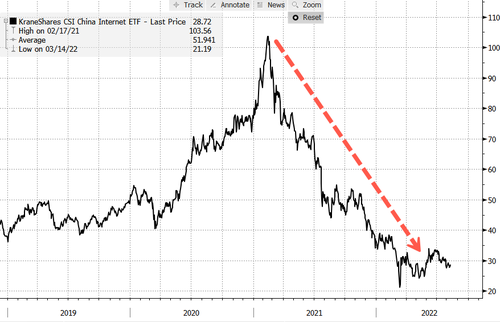
Five U.S.-listed Chinese state-owned companies unexpectedly announced plans to delist from US exchanges over SEC audit requirements, Bloomberg reported. In separate filings on the Hong Kong stock exchange, PetroChina, China Petroleum & Chemical, China Life Insurance, Sinopec Shanghai Petrochemical, and Aluminum Corp. of China, some of the largest state-owned companies, said they would voluntarily delist their American depositary share (ADRs) from the New York Stock Exchange.
All five companies said to expect an SEC filing to delist the securities by the end of the month, adding that delisting their ADSs would occur ten days after that.
According to the PetroChina filing, continued US listing meant "considerable administrative burden for performing the disclosure obligations," plus the companies complained about low trading volumes on the NYSE.
The delisting announcements come one week after US House Speaker Nancy Pelosi's trip to Taiwan angered Bejing. For years, the Chinese have shunned US auditors from inspecting the books. If both countries cannot agree with rules for Chinese auditing companies, then the SEC will delist them from US exchanges by 2024.
About 300 businesses based in China and Hong Kong, with over $2.4 trillion in market value, risk being kicked off US Exchanges as the SEC increases scrutiny of the firms, Bloomberg Intelligence estimated in May. Among the biggest are China Life, PetroChina, China Petroleum & Chemical, Alibaba Group Holding Ltd. and Baidu Inc.
"These state-owned enterprises are in strategic sectors and deemed to have access to information and data that the Chinese government may be hesitant to give access to foreign regulators," said Redmond Wong, a strategist at Saxo Markets.
The news of the sudden plans to delist major state-owned companies sent Alibaba Group Holding Ltd., Pinduoduo Inc., and JD.com Inc down 3% to 4% in the premarket US on Friday morning. Kraneshares CSI China Internet Fund ETF declined nearly 3%.
There's been a multi-year overhang on Chinese ADRs that has impacted stock prices. Today's delisting news will create even more negativity among investors about US-listed Chinese stocks as it becomes more unlikely an agreement on auditing will be reached.
Here's what analysts had to say, courtesy of Bloomberg:
Bloomberg Intelligence (Marvin Chen)
- "The delisting of the SOE ADR may have little impact on the companies themselves as turnover from US markets are minimal. The moves may be symbolic of the escalating tensions between US and China."
- "We may see more voluntary SOE delistings as we approach the auditing deadline. On the positive side it could mean that China may be ready to reach an auditing deal for those companies still listed in the US."
EFG Asset Management HK Ltd (Daisy Li)
- "I think this will impact investor sentiment towards ADRs. However, these come backs are within expectation as ADRs of Chinese SOEs see very low trading volume in the US and many foreign funds cannot invest in them."
- People hold quite bearish views on ADRs thinking it is unlikely that an agreement on the auditing issue can be reached
Saxo Markets (Redmond Wong)
- These state-owned enterprises are in strategic sectors and deemed to have access to information and data that the Chinese government may be hesitant to give access to foreign regulators. Plus, they have only small market capitalization in ADSs
- It seems not surprising that they choose to delist from the New York stock exchange
GAM Investment Management (Jian Shi Cortesi)
- "It's increasingly clear to Chinese companies that amid the U.S.-China rivalry the US listings of Chinese companies could face the risk of delisting. This has been an overhang on Chinese ADRs. We expect more Chinese firms to voluntarily delist from the US or move their primary listings to Hong Kong."
- "This creates short-term noises. However, Hong Kong listed stocks don't trade at a discount to US ADRs in terms of valuations. ADRs are normally not accessible to Chinese mainland investors, but Hong Kong listings have the potential to be included in the Stock Connect program and be tradeable for mainland investors."
Uob Kay Hian (Hong Kong) Limited (Steven Leung)
- Think the delisting of Sinopec and PetroChina "just a matter of time" and more companies could follow suite With the current Sino-US relationship, it is unlikely that they can reach any auditing agreement that China will accept
- As listing in the US hasn't really helped with equity financing over the past years, but need to comply with tighter regulations, most of them should choose to delist from US and come back
Kamet Capital Partners Pte (Kerry Goh)
- These are all state-owned companies so it seems like they have received some directive from the government
- Unlikely to be huge impact because they are not actively traded in the US. The impact on sentiment in the Chinese stock market will also be minimal
CMC Markets (Singapore) Pte. (Kelvin Wong)
- All these announcements seem to signal a more strained relationship between US and China as the US is no longer deemed as a suitable financial center for Chinese firms to raise capital
- Investors should be mindful of an impending rising geopolitical risk premium that is not fully priced into the markets at the moment. The recent tensions over Taiwan seem to reinforce these delisting actions
Five U.S.-listed Chinese state-owned companies unexpectedly announced plans to delist from US exchanges over SEC audit requirements, Bloomberg reported. In separate filings on the Hong Kong stock exchange, PetroChina, China Petroleum & Chemical, China Life Insurance, Sinopec Shanghai Petrochemical, and Aluminum Corp. of China, some of the largest state-owned companies, said they would voluntarily delist their American depositary share (ADRs) from the New York Stock Exchange.
All five companies said to expect an SEC filing to delist the securities by the end of the month, adding that delisting their ADSs would occur ten days after that.
According to the PetroChina filing, continued US listing meant “considerable administrative burden for performing the disclosure obligations,” plus the companies complained about low trading volumes on the NYSE.
The delisting announcements come one week after US House Speaker Nancy Pelosi’s trip to Taiwan angered Bejing. For years, the Chinese have shunned US auditors from inspecting the books. If both countries cannot agree with rules for Chinese auditing companies, then the SEC will delist them from US exchanges by 2024.
About 300 businesses based in China and Hong Kong, with over $2.4 trillion in market value, risk being kicked off US Exchanges as the SEC increases scrutiny of the firms, Bloomberg Intelligence estimated in May. Among the biggest are China Life, PetroChina, China Petroleum & Chemical, Alibaba Group Holding Ltd. and Baidu Inc.
“These state-owned enterprises are in strategic sectors and deemed to have access to information and data that the Chinese government may be hesitant to give access to foreign regulators,” said Redmond Wong, a strategist at Saxo Markets.
The news of the sudden plans to delist major state-owned companies sent Alibaba Group Holding Ltd., Pinduoduo Inc., and JD.com Inc down 3% to 4% in the premarket US on Friday morning. Kraneshares CSI China Internet Fund ETF declined nearly 3%.
There’s been a multi-year overhang on Chinese ADRs that has impacted stock prices. Today’s delisting news will create even more negativity among investors about US-listed Chinese stocks as it becomes more unlikely an agreement on auditing will be reached.
Here’s what analysts had to say, courtesy of Bloomberg:
Bloomberg Intelligence (Marvin Chen)
- “The delisting of the SOE ADR may have little impact on the companies themselves as turnover from US markets are minimal. The moves may be symbolic of the escalating tensions between US and China.”
- “We may see more voluntary SOE delistings as we approach the auditing deadline. On the positive side it could mean that China may be ready to reach an auditing deal for those companies still listed in the US.”
EFG Asset Management HK Ltd (Daisy Li)
- “I think this will impact investor sentiment towards ADRs. However, these come backs are within expectation as ADRs of Chinese SOEs see very low trading volume in the US and many foreign funds cannot invest in them.”
- People hold quite bearish views on ADRs thinking it is unlikely that an agreement on the auditing issue can be reached
Saxo Markets (Redmond Wong)
- These state-owned enterprises are in strategic sectors and deemed to have access to information and data that the Chinese government may be hesitant to give access to foreign regulators. Plus, they have only small market capitalization in ADSs
- It seems not surprising that they choose to delist from the New York stock exchange
GAM Investment Management (Jian Shi Cortesi)
- “It’s increasingly clear to Chinese companies that amid the U.S.-China rivalry the US listings of Chinese companies could face the risk of delisting. This has been an overhang on Chinese ADRs. We expect more Chinese firms to voluntarily delist from the US or move their primary listings to Hong Kong.”
- “This creates short-term noises. However, Hong Kong listed stocks don’t trade at a discount to US ADRs in terms of valuations. ADRs are normally not accessible to Chinese mainland investors, but Hong Kong listings have the potential to be included in the Stock Connect program and be tradeable for mainland investors.”
Uob Kay Hian (Hong Kong) Limited (Steven Leung)
- Think the delisting of Sinopec and PetroChina “just a matter of time” and more companies could follow suite With the current Sino-US relationship, it is unlikely that they can reach any auditing agreement that China will accept
- As listing in the US hasn’t really helped with equity financing over the past years, but need to comply with tighter regulations, most of them should choose to delist from US and come back
Kamet Capital Partners Pte (Kerry Goh)
- These are all state-owned companies so it seems like they have received some directive from the government
- Unlikely to be huge impact because they are not actively traded in the US. The impact on sentiment in the Chinese stock market will also be minimal
CMC Markets (Singapore) Pte. (Kelvin Wong)
- All these announcements seem to signal a more strained relationship between US and China as the US is no longer deemed as a suitable financial center for Chinese firms to raise capital
- Investors should be mindful of an impending rising geopolitical risk premium that is not fully priced into the markets at the moment. The recent tensions over Taiwan seem to reinforce these delisting actions







